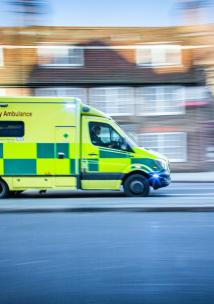London Ambulance Service Strategy 2023–2028: Healthwatch Kingston Community Engagement Report and Recommendations

Healthwatch Kingston created an online survey using the questions provided by London Ambulance Service. Over 100 people responded to the survey but not everyone answered every question.
Responses to the Healthwatch Kingston community engagement generally praised the service provided by London Ambulance Service public facing staff. Complaints and issues were often caveated with notes about how difficult things appear to be and an appreciation for the challenges the London Ambulance Service faces in delivering their services.
Summary of what was learned:
- People are very appreciative of the quality of service provided by front-line LAS staff, but believe emergency services are being hampered by other parts of the health and care system as well as the public’s lack of understanding about when to use the service and when to use alternatives.
- Feedback suggested 111 are often unable to support someone who was trying to avoid using 999 or A&E departments at hospital.
- People wanted more education for the community on how to support themselves before emergency intervention is required.
- They felt emergency support should be readily available, and that wait times were too long with most respondents believing this to be the result of people using emergency services when they could use their GP, pharmacy, or local voluntary/community sector organisation.
At LAS, we are committed to listening to patients and the public as a fundamental part of our mission to improve standards of care for everyone. London has a hugely diverse population with a wide variety of needs and Healthwatch is uniquely embedded within London communities, so we have been delighted to work with them on this by commissioning engagement reports. The rich insights from their reports will inform the development of our five year strategy and help us to put the people we serve at the heart of all we do.
Download the full report
Healthwatch Kingston upon Thames recommendations to help inform the London Ambulance Strategy 2023 – 2028
- Improve ways to share patient data gathered by the London Ambulance Service in a timely manner across other health and care professionals to raise awareness of the need for seamless pathways of care for patients.
- Improve awareness of what the London Ambulance Service is doing locally (such as the cycling paramedic in Kingston upon Thames) and how residents and businesses can get involved (such as becoming volunteer community first or emergency responders).
- Improve the accessibility of public messaging about when to call 111 and 999 through different media, including but not limited to, Plain English, Easy Read, short information films and translations into languages other than English. In addition, the London Ambulance Service should work with NHS and Local Authority partners to explore ways to work more effectively with Voluntary Community and Social Enterprise organisations to support improved understanding about 111 and 999 across all local communities.
- Work with NHS and Local Authority partners to provide public guidance about what belongings might be needed by a patient when travelling by ambulance into hospital. (Explore learning from the care home ‘Red Bag’ scheme).
- Continue to learn from locally gathered insight about specific community health and care needs that might create additional demand upon LAS.
- Work with 111 to improve triaging and signposting to non-emergency services (including Voluntary Community and Social Enterprise organisations) to help reduce escalation to urgent care and emergency departments.
- Improve support for London Ambulance Service staff to help ensure the retention of workforce.
- Ensure issues affecting efficient delivery of the London Ambulance Service are represented at appropriate meetings within SWL Integrated Care System and Kingston Hospital and similar bodies across London.
- Share statistical London Ambulance Service data with local public health teams to support increased understanding about demand for services.
- Provide a clear plan and timescale on when the London Ambulance Service will become carbon neutral.
- Introduce a process to support London Ambulance Service staff to identify if the person needing emergency care is supported by an unpaid carer/young carer, so that they included in communications relating to the patient. Also, consider if London Ambulance Service staff might provide information to local carer organisations (such as Kingston Carers Network) to flag up that a patient may now need support from an unpaid carer after being discharged back into the community.
- Ensure public facing London Ambulance Service staff are provided training about how to engage with and support people with learning disabilities and autism.
- Introduce a process to support London Ambulance Service staff identify if a caller/person needing emergency support has a learning disability or autism so staff can then communicate appropriately.

